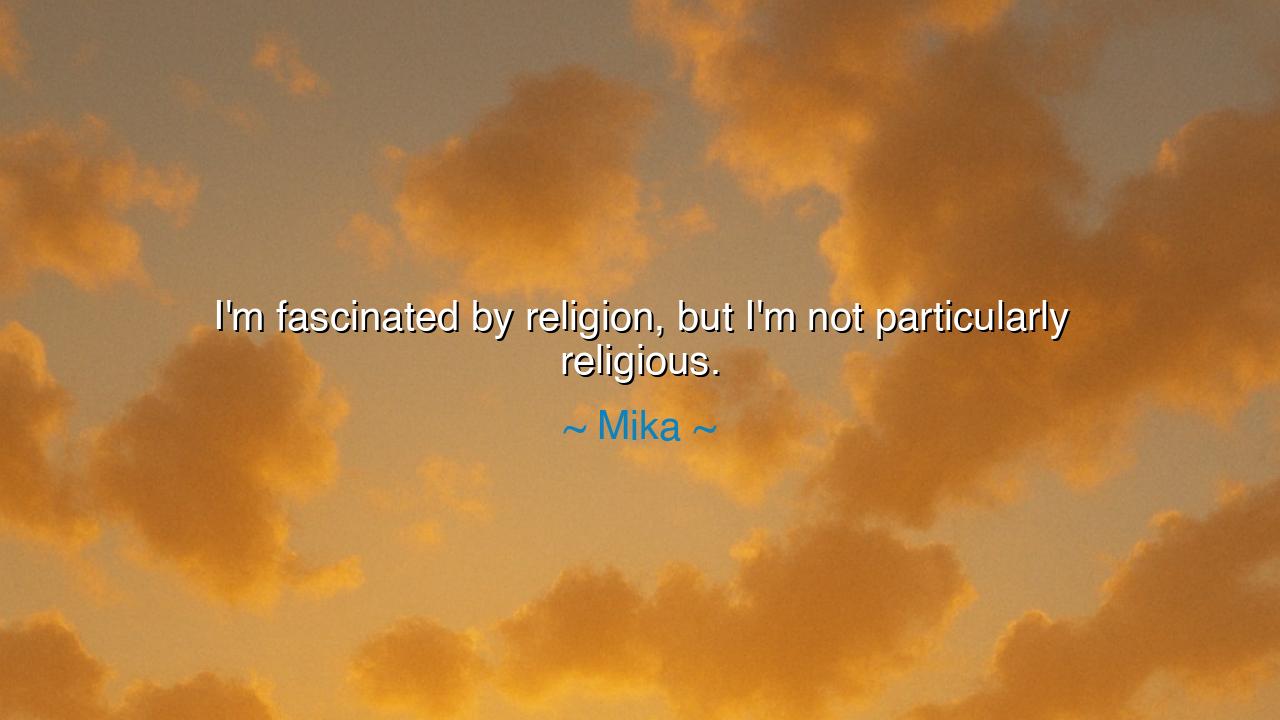
I'm fascinated by religion, but I'm not particularly religious.






"I'm fascinated by religion, but I'm not particularly religious." These words, spoken by Mika, reflect a profound tension that many individuals experience in the modern world—an attraction to the ideas, symbols, and rituals of religion, without necessarily adhering to its doctrines or organized practices. Mika’s statement speaks to a curiosity about the mysteries of life, the divine, and the human spirit, while also acknowledging the freedom of choosing one’s own path, unbound by the constraints of institutionalized faith. His words carry with them the age-old search for meaning, and the struggle to reconcile spirituality with the complex reality of contemporary life.
In ancient times, great minds grappled with similar questions. The Greek philosophers, such as Socrates and Plato, were deeply interested in the nature of the divine and the role of religion in human life, but they did not follow the rituals of the gods with blind devotion. Socrates, for instance, was not a traditional worshipper, yet he acknowledged the power of the divine in his life, often speaking of the daimonion, a divine voice or spirit that guided his actions. Plato, too, was fascinated by the idea of a higher realm, where the divine order ruled over the chaos of the material world, but he believed that true wisdom came from within, through the pursuit of knowledge and inner reflection. Like Mika, they were fascinated by religion but saw their path as one that transcended the simple act of worship, moving instead toward a deeper philosophical exploration of the nature of existence.
This tension between fascination and devotion is not new. Thomas Jefferson, one of the founding fathers of the United States, was similarly captivated by the teachings of Christianity but rejected the dogma of the Church. He admired the moral philosophy of Jesus Christ but could not accept the supernatural claims of divinity that were tied to the religion. In his later years, Jefferson even created his own version of the Gospels, stripping away the miraculous elements to focus purely on the teachings of Jesus about love, morality, and human conduct. His relationship with religion was one of intellectual curiosity, where he sought the wisdom of religious texts without being bound by their theological claims. Like Mika, he was fascinated by religion but did not subscribe to it in a traditional sense.
The Roman emperor Marcus Aurelius, too, offers a compelling example of someone who engaged with the spiritual and religious aspects of life, yet did not fully embrace the doctrines of the state religion. As a Stoic philosopher, he believed in virtue, reason, and the cosmic order, but his spirituality was grounded more in the rational understanding of the universe rather than traditional religious practices. He respected the divine as part of the natural world but did not view the gods as beings to be appeased through sacrifice or ritual. His approach was one of reverence for the divine order, but not submission to the organized religion of his time. This mindset, akin to Mika’s, reflects a fascination with religion, but also an assertion of personal freedom in spiritual matters.
In more recent times, individuals have increasingly moved away from strict religious affiliations, choosing instead to explore spirituality in a more personal and individualized way. The rise of secularism, combined with the freedom of intellectual exploration, has allowed many to approach religion from an intellectual perspective, drawing from various faiths and philosophies while rejecting institutional authority. Like Mika, many are intrigued by the mysteries of existence, the search for purpose, and the ideas of morality and compassion found in religious teachings, but do not feel compelled to follow the prescribed rituals or dogmas.
The lesson we take from Mika’s words is not a dismissal of religion but rather an invitation to explore it with an open mind and heart. Religion, in its various forms, offers a treasure trove of wisdom, stories, and moral guidance. However, we must not be bound by the fear of orthodoxy or the chains of doctrine. Instead, we should approach spirituality with curiosity, seeking what resonates with us personally and what enriches our understanding of human nature, compassion, and life’s purpose. We are called not to blindly follow but to explore, question, and grow.
In our own lives, we must remain open to the lessons that religion offers, but also question and reflect on them with wisdom. The goal is not to abandon faith but to find our own spiritual path—one that aligns with our deepest values and beliefs, free from the constraints of dogma. Like Socrates, Jefferson, and Aurelius, we can draw wisdom from the great spiritual traditions of the world, while charting our own course through the mysteries of existence. Let us embrace the curiosity of Mika’s perspective, always seeking to learn, understand, and grow without the need for blind devotion, but rather with a commitment to truth, wisdom, and personal integrity.






AAdministratorAdministrator
Welcome, honored guests. Please leave a comment, we will respond soon